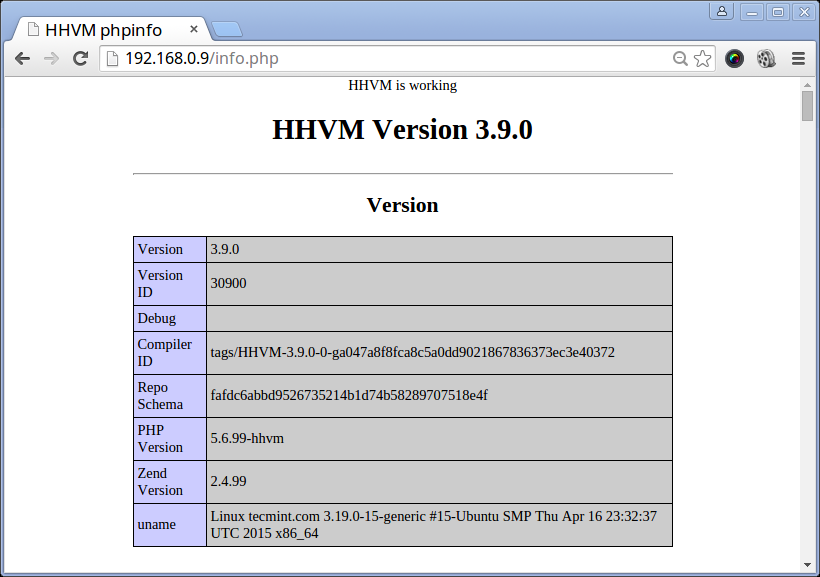在Ubuntu系统上搭建Nginx+HHVM+MySQL开发环境的教程
人气:0貌似最近这个HHVM特别火,其主要原因大概要归咎于大的运行效率吧,安装完之后使用探针测试,计算运行的时间都是0.0*的级别,据说在512M的内存下也可以跑的完美,大大大大大大地提高了网站运行效率。目前,HHVM在CentOS、Ubuntu、debian下都可以正常运行,下面我们就来说说在Ubuntu下运行HHVM+Nginx+Mysql的过程。
1、首先是安装Nginx,执行:
sudo apt-get update
sudo apt-get install -y unzip vim git-core curl wget build-essential python-software-properties</p> <p>sudo add-apt-repository -y ppa:nginx/stable
sudo apt-get update
sudo apt-get install -y nginx
sudo apt-get install -y unzip vim git-core curl wget build-essential python-software-properties</p> <p>sudo add-apt-repository -y ppa:nginx/stable
sudo apt-get update
sudo apt-get install -y nginx
2、 在此阶段,我们将安装 HHVM。我们需要添加 HHVM 的仓库到你的sources.list文件中,然后更新软件列表。
重要:不要忘记用你的 Ubuntu 发行版代号替换上述的 DISTRIBUTION_VERSION (比如:lucid, precise, trusty) 或者是 Debian 的 jessie 或者 wheezy。在 Linux Mint 中也是一样的,不过只支持 petra。
添加了 HHVM 仓库之后,你就可以轻松安装了。
# apt-get install -y hhvm
安装之后,就可以启动它,但是它并没有做到开机启动。可以用如下命令做到开机启动。
# update-rc.d hhvm defaults
3、等待安装完成,执行如下FastCGI配置的脚本:
sudo /usr/share/hhvm/install_fastcgi.sh
sudo /etc/init.d/nginx restart #重启Nginx
sudo update-rc.d hhvm defaults #开机启动
sudo service hhvm restart #重启hhvm
sudo /etc/init.d/nginx restart #重启Nginx
sudo update-rc.d hhvm defaults #开机启动
sudo service hhvm restart #重启hhvm
PS: 如果你想像执行PHP命令那样使用HHvm,可以执行:sudo /usr/bin/update-alternatives –install /usr/bin/php php /usr/bin/hhvm 60,这样就可以使用:php -v这样的命令了。
4、安装Mysql,执行如下命令,安装过程会让你输入2次密码:
apt-get install mysql-server
5、将MysqL添加到开机启动,命令:chkconfig add mysqld 和 chkconfig mysql on,(ps:如果有提示说:/sbin/insserv: No such file or directory,执行:ln -s /usr/lib/insserv/insserv /sbin/insserv,再执行:chkconfig –levels 235 mysql on),接着你可以下载phpmyadmin放在文章目录直接管理MySQL啦,默认用户名为root。
6、测试 HHVM 和 Nginx/Apache
为了确认 hhvm 是否工作,你需要在 nginx/apache 的文档根目录下建立 hello.php。
# nano /usr/share/nginx/html/hello.php
在文件中添加如下代码:
PHP Code复制内容到剪贴板
- <?php
- if (defined('HHVM_VERSION')) {
- echo 'HHVM is working';
- phpinfo();
- } else {
- echo 'HHVM is not working';
- }
- ?>
然后访问如下链接,确认自己能否看到 "hello world"
http://localhost/info.php
或
http://IP-Address/info.php
加载全部内容